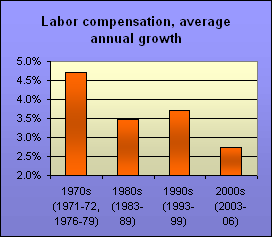Some argue that it's simply a problem of perceptions. Yesterday, George H.W. Bush (#41) complained that even though the economy is very good, for some reason the Republican White House has been unable to convince people of that fact. As reported by the Dallas Morning News:
Former President George Bush said Tuesday that although he believes the U.S. economy is strong, he's worried that the average citizen might not be getting that message.It's true, one possible explanation for the fact that many Americans don't think the economy is doing very well is that there is some sort of conspiracy to hide the truth from the American people. This conspiracy presumably somehow overwhelms the fact that the American people do actually live in the US economy, and thus probably have some independent information about the condition of the US economy.
Speaking at a restaurant industry conference in Dallas, Mr. Bush pointed to third-quarter earnings gains, robust growth in the gross domestic product and "unemployment that has fallen to good levels."
"The unmistakable picture that those statistics mean to me is that the economy is strong," the 41st president told attendees of the Multi-Unit Foodservice Operators conference, who gave him a standing ovation when he entered the room.
"There is a concerted effort to make it appear that the economy is bad," said Mr. Bush, the father of President George W. Bush.
However, an alternative (and in my mind, far more plausible) explanation is simply that the US economy has not, in fact, been that great from the point of view of average Americans. It turns out that there's a fair amount of economic data to support this latter possibility.
Take a look at the following pictures. I tried to think of those macro data series that most closely reflect the average person's experience: the amount of work available (measured as the total hours of labor demanded by firms), the average hourly earnings of workers in the private sector, the amount of overall compensation that individuals receive for their work (thus excluding capital income), and the actual salaries and wages that people earn. All data is expressed in real (inflation-adjusted) terms, and in each decade recession years are excluded.




It's quite striking that by each of these measures, the US economy performed quite poorly since 2003. The current economic expansion has simply not delivered the employment or wage growth that people expect from the US economy.
So why hasn't Bush gotten credit for the state of the US economy? Actually, I think that he has. And from the GOP's point of view, that's exactly the problem.
UPDATE: PGL has much more on this subject at Angry Bear, including a good dissection of some typical Republican talking points on the economy, as presented by James Sherk of the Heritage Foundation. In addition to playing some cute games with starting and ending points in their data analysis (see Sherk's piece and PGL's rebuttal for examples), those who argue that the economy is really a lot better than the average American thinks still need to answer the important question that I tried to highlight above: why do so many people perceive the economy as being so mediocre, if it's really so great?
No comments:
Post a Comment